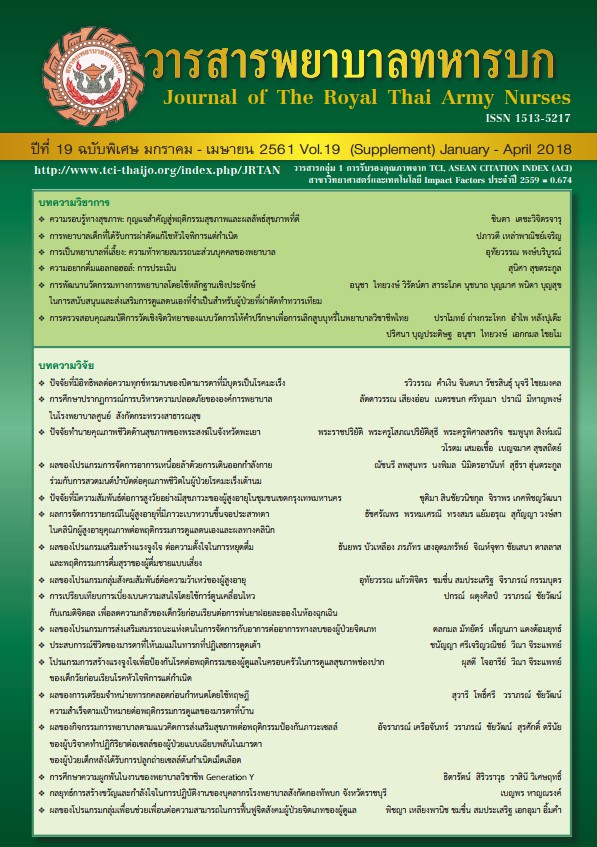The Effect Of Brief Couple Relationship Therapy Program On Alcohol Consumptions Among Alcohol Dependence
Keywords:
Brief Couple Relationship Therapy, Alcohol Consumptions, Alcohol DependenceAbstract
The objectives of this quasi-experimental pretest-posttest control group research design. were to compare 1) alcohol consumption behavior among patients with alcohol dependence before and after receiving a brief couple relationship therapy program, and 2) alcohol consumption behavior among patients with alcohol dependence who received brief couple relationship therapy program and those who received regular care. The sample were 40 family of patients with alcohol dependence and his spouse who had been following up after treatment at the Psychiatry and Neurology outpatient department of Phramongkutklao ( PMK ) Hospital. The patients were recruited from those who completed the PMK rehabilitation model within a year. The samples were matched-pair to have similar characteristics by patient’ alcohol consumption score and age, and then randomly assigned to either experimental or control group, 20 families in each group. The experimental group received the brief couple relationship therapy program developed from Fals-Stewart et al.(2005), whereas the control group received regular care. The research instruments are: 1) the brief couple relationship therapy program, 2) the demographic questionnaire, 3) the AUDIT scale ,4) the Alcohol
Timeline Follow back, and 5) the Dyadic Adjustment Scale. All instruments were verified for content validity. The reliability of the 4th instrument is reported with Pearson product moment correlation as of .97. Descriptive statistics and t-test were used in Data analysis. The conclusions of this research are as follows: 1) after the experiment, the alcohol consumption behavior of patients with alcohol dependence who received brief couple relationship therapy program was significantly different than that before at p.05, by which the total number of drinks and the percentage of heavy drinking days were lower whereas the percentages of days abstinent were higher than that before; 2) after the experiment, the alcohol consumption behavior of patients with alcohol dependence who received brief couple relationship therapy program was significantly different from those who received regular care at p.05, by which the total number of drinks and the percentage of heavy drinking days among the experimental group were lower whereas the percentages of days abstinent were higher than those in the
control group.
References
Statistical Department. 2014. (in Thai).
2. Saengduenchai S. The Effect of Cognitive-Behavioral Therapy Program, with Social Support, on Readiness for Early Relapse Prevention and Non-Relapse of Alcohol Use Disorder Patients. 2010. Dissertation, Ph.D. Applied Behavioral Science Research. Bangkok. Graduate school, Srinakharinwirot University
3. Sinpakit P.,Pompisand K.,Krittiratanapiboon P. Prevalence and mental health of Thai Alcoholics. 1999. Suan Pung hospital Department of Mental Health.
4. Thanyarak Institute .StatisticalTreatment of Patients with Fiscal Year 2009-2011.
5. Phramongkutklao Hospital. Statistics of treatment for patients in fiscal year 2013-2015.
6. Edwards M, Steinglass P. Family therapy treatment outcomes for alcoholism. 1995. Journal of Marital and Family Therapy; 21: 475–509
7. Totharong P. Experience of persistent cut down of alcohol intake among former alcohol dependence. 2008. Journal of Nursing Science Naresuan University 2008; 2(2)
8. O’Farrell, TJ. A behavioral marital therapy couples group program for alcoholics and theirspouses. 1993. In O’Farrell, TJ., editor. Treating alcohol problems : Marital and family interventions. New York: Guilford Press. p. 170-209
9. O’Farrell TJ. Review of outcome research on marital and family therapy in treatment of alcoholism.2012. J Marital Fam Ther 38(1) : 122–144.
10. O’Farrell, TJ., Richard R., El-Guebaly N. Implementing Behavioral Couples Therapy for substance abuse patients: An international dissemination
project from Boston to Calgary. 2010. Poster presented at the World Congress on Behavior Therapy. Boston.
11. O’Farrell, TJ., Fals-Stewart W. Behavioral couples therapy for alcoholism and drug abuse. 2006. Guilford Press
12. O’Farrell TJ., Murphy CM., Stephan SH., Fals-Stewart W., Murphy M. Partner violencebefore and after couple-based alcoholism treatment for male alcoholic patients:The role of treatment involvement and abstinence. 2004. Journal of Consulting and Clinical Psychology 72 : 202–217.
13. Srikosai so., Thapinta D., Kittirattanapaiboon P., Piyawatkul N. Development and Quality Testing of Alcoholism Severity Measurement Form. 2012. Thai Journal of Nursing Council ; 27(4) 69-83
14. Soomlek S. A Causal Model of Maternal Role Mastery Among First Time Mother. 1995. Ph.D.Nursing Science. Mahidol University. Bangkok (Thailand). Graduate School.
16. Sinlapakit P. and Kittirattanapaiboon P. Alcohol use problem assessment model for Primary care. 2010. 2nd edition. Bangkok: Tantawan Paper.
17. Sobell, L.C. & Sobell, M.B. Alcohol Timeline Followback Users’ Manual. Toronto, Canada. 1995. Addiction Research Foundatio
18. Spanier, G.B. Measuring dyadic adjustment: New scales for assessing the quality of marriage and similar dyads. 1976. Journal of Marriage and the Family; 38: 15-28.
Downloads
Published
How to Cite
Issue
Section
License
บทความหรือข้อคิดเห็นใดใดที่ปรากฏในวารสารพยาบาลทหารบกเป็นวรรณกรรมของผู้เขียน ซึ่งบรรณาธิการหรือสมาคมพยาบาลทหารบก ไม่จำเป็นต้องเห็นด้วย
บทความที่ได้รับการตีพิมพ์เป็นลิขสิทธิ์ของวารสารพยาบาลทหารบก
The ideas and opinions expressed in the Journal of The Royal Thai Army Nurses are those of the authors and not necessarily those
of the editor or Royal Thai Army Nurses Association.





